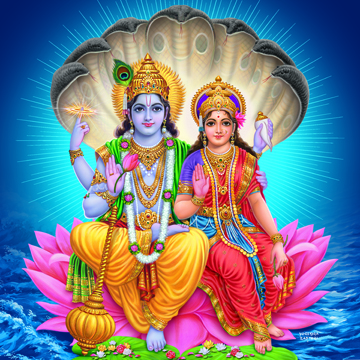Vishnu Ji

Lord Vishnu (विष्णु) is one the supreme deity in Hinduism. In a concept in Hinduism Brahma, Vishnu and Shiva are the Trimurti in which the cosmic functions of creation, maintenance, and destruction are personified by the forms of Brahma the creator, Vishnu the maintainer or preserver, and Lord Shiva (शिव) the destroyer or transformer. The Vishnu Sahasranama declares Vishnu as Paramatma (supreme soul) and Parameshwara (supreme God ). It describes Vishnu as the All-Pervading essence of all beings, the master of the past, present and future, one who supports, sustains and governs the Universe.
In the Puranas, Vishnu is described as having the divine colour of water filled clouds, four-armed, holding a lotus, mace (Gada), conch (shankha ) and chakra (wheel). Vishnu is also described in the Bhagavad Gita as having a 'Universal Form' (Vishvarupa) which is beyond the ordinary limits of human perception or imagination.
Vishnu is a main Vedic God, venerated as the Supreme Being in the Vaishnavism. He is also commonly known as Narayana or Hari. Smarta followers of Adi Shankara, among others, venerate Vishnu as one of the five primary forms of God. The Vishnu Sahasranama declares Vishnu as Paramatman (supreme soul) and Parameshwara (supreme God). It describes Vishnu as the All-Pervading essence of all beings, the master of and beyond the past, present and future, one who supports, sustains and governs the Universe and originates and develops all elements within. This illustrates the omnipresent characteristic of Vishnu. Vishnu governs the aspect of preservation and sustenance of the universe, so he is called "Preserver of the universe".
